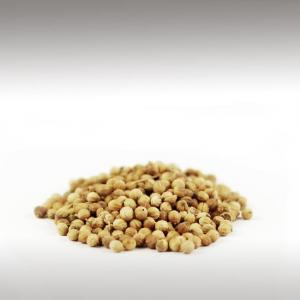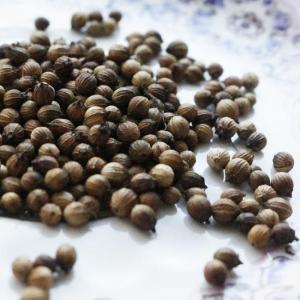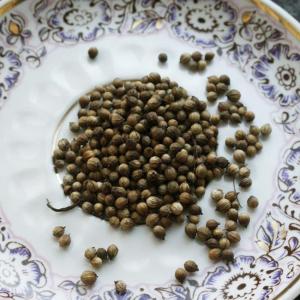
CORIANDER ESSENTIAL OIL (CORIANDRUM SATIVUM) - ESSENTIAL OILS

BASE / GENERAL DATA
Information submited: May 31, 2015 Modified: March 7, 2018 By: OperaDreamhouse
Botanical Name: Coriandrum sativum
Common Method of Extraction: Steam distillation
Part Typically Used: Crushed ripe seeds
Color: Pale yellow
Consistency: Thin
Perfumery Note: Top
Strength of Initial Aroma: Sweet, spicy, warm smell.
Coriander also known as Cilantro Chinese Parsley or Dhania, is an annual herb in the family Apiaceae. Coriander is native to regions spanning from southern Europe and northern Africa to southwestern Asia. An herb originating in Egypt.
The annual or biennial plant is a native of Morocco and grows to about 1 meter in height. The leaves are variable in shape, broadly lobed at the base of the plant, and slender and feathery higher on the flowering stems. The flowers are borne in small umbels, white or very pale pink. The fruit is a globular, dry schizocarp 3-5 mm in diameter. The seeds are generally used as a spice or an added ingredient in other foods or recipes, although sometimes they are eaten alone.
The leaves, when crushed, give off an unpleasant odor like squashed bugs. The Greek name "Koris" is the root word for Coriander.
The seeds have been used for thousands of years by the Egyptians, as an aphrodisiac (with seeds even found in the tomb of Tutankhamun) and by the Romans and Greeks to flavor their wines, while the Indians use it in their cooking.
The Carmelite order in France used the seeds to flavor their 17th century toilet water.
Chemicla strucutre:
Coriander oil is extracted from the crushed ripe seeds bysteam distillation and yields 0,8-1,0 % oil.
Coriander essential oil consists of compounds likeBorneol, Cineole, Cymene, Dipentene, Linalool, Phellandrene, Pinene, Terpineol and Terpinolene.
Common Method of Extraction: Steam distillation
Part Typically Used: Crushed ripe seeds
Color: Pale yellow
Consistency: Thin
Perfumery Note: Top
Strength of Initial Aroma: Sweet, spicy, warm smell.
Coriander also known as Cilantro Chinese Parsley or Dhania, is an annual herb in the family Apiaceae. Coriander is native to regions spanning from southern Europe and northern Africa to southwestern Asia. An herb originating in Egypt.
The annual or biennial plant is a native of Morocco and grows to about 1 meter in height. The leaves are variable in shape, broadly lobed at the base of the plant, and slender and feathery higher on the flowering stems. The flowers are borne in small umbels, white or very pale pink. The fruit is a globular, dry schizocarp 3-5 mm in diameter. The seeds are generally used as a spice or an added ingredient in other foods or recipes, although sometimes they are eaten alone.
The leaves, when crushed, give off an unpleasant odor like squashed bugs. The Greek name "Koris" is the root word for Coriander.
The seeds have been used for thousands of years by the Egyptians, as an aphrodisiac (with seeds even found in the tomb of Tutankhamun) and by the Romans and Greeks to flavor their wines, while the Indians use it in their cooking.
The Carmelite order in France used the seeds to flavor their 17th century toilet water.
Chemicla strucutre:
Coriander oil is extracted from the crushed ripe seeds bysteam distillation and yields 0,8-1,0 % oil.
Coriander essential oil consists of compounds likeBorneol, Cineole, Cymene, Dipentene, Linalool, Phellandrene, Pinene, Terpineol and Terpinolene.

SPIRITUAL PRACTISES DATA

MEDICINE / HEALTH DATA

BEAUTY / COSMETICS DATA

FOOD / COOKING DATA
COMMENTS
No comments.




